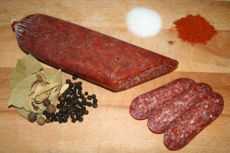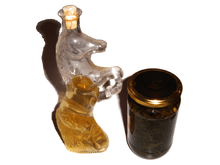Bulgarian cuisine
| Part of a series on |
| Bulgarians българи |
|---|
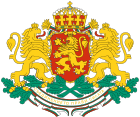 |
| Culture |
|
| By country |
|
| Subgroups |
|
| Religion |
| Language |
|
| Other |
|

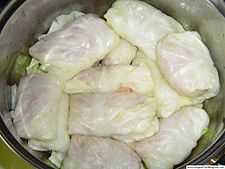
Bulgarian cuisine (Bulgarian: българска кухня, balgarska kuhnya) is a representative of the cuisine of Southeastern Europe. Essentially South Slavic[<span title="what is "Essentially South Slavic"? source? (October 2013)">citation needed], it shares characteristics with other Balkans cuisines. Owing to the relatively warm climate and diverse geography affording excellent growth conditions for a variety of vegetables, herbs and fruits, Bulgarian cuisine is diverse.
Famous for its rich salads required at every meal, Bulgarian cuisine is also noted for the diversity and quality of dairy products and the variety of Bulgarian wines and local alcoholic drinks such as rakia, mastika and menta. Bulgarian cuisine features also a variety of hot and cold soups, an example of a cold soup being tarator. There are many different Bulgarian pastries as well such as banitsa.
Most Bulgarian dishes are oven baked, steamed, or in the form of stew. Deep-frying is not very typical, but grilling - especially different kinds of meats - is very common. Pork meat is the most common meat in the Bulgarian cuisine. Oriental dishes do exist in Bulgarian cuisine with most common being moussaka, gyuvetch, and baklava. A very popular ingredient in the Bulgarian white brine cheese called "sirene" (сирене). It is the main ingredient in many salads, as well as in a variety of pastries. Fish and chicken are widely eaten and while beef is less common as most cattle are bred for milk production rather than meat, veal is a natural byproduct of this process and it is found in many popular recipes. Bulgaria is a net exporter of lamb and its own consumption of the meat is prevalent during its production time in spring.[1]
Traditionally Bulgarians have consumed a notable quantity of yogurt per head and is noted historically for the production of high quality yogurt, including using a unique variety of micro-organism called Lactobacillus bulgaricus in the manufacturing process.[2] Bulgaria has been part of a region that has cultivated and consumed yogurt from as far back as 3000 BC.[3]
Certain entrees, salads, soups and dishes go well with alcoholic beverages and the alcohol of choice for some is Bulgarian wine.
Holiday meals
There are several holidays that are characterized by specific meals. On Christmas Eve, it is a tradition to have vegetarian stuffed peppers and vegetarian stuffed vine leaves. On New Year's Eve, there are dishes made with cabbage. On Nikulden (Nicholay's Day; December 6), people usually cook fish, while on Gergyovden (George’s Day; May 6), it is a tradition to eat roast lamb.
Traditional Bulgarian foods




Cold cuts
- Lukanka
- Sujuk
- Sazdarma
- Black pudding
- Karnacheta
- Bahur
- Banski Starets
- Strandjanski Dyado
- Pacha
- Elenski but
Soups
- Tarator
- Bob chorba
- Shkembe chorba
- Kurban chorba
- Teleshko vareno (Boiled veal meat and vegetables soup.)
- Tomato soup with cheese
- Supa Topcheta(Soup with little meatballs.)
- Cold Gardening soup (Traditional from Zheravna.)
- Fisherman's soup
- Chicken soup
- Mushroom soup
- Nettle soup
- Milk soup with or without cheese
Salads and relishes
- Shopska salad
- Snow White salad or Milk salad
- Milk salad with baked peppers
- Ovcharska Salad
- Easter Salad (Traditional Easter salad with sliced boiled eggs, with dressing - oil and vinegar, and topped with Sharena sol.)
- Salad with Carrots and Cabbage
- Bean salad
- Turshiya
- Kyopolou
- Potato salad
- Green Salad (Lettuce,Green Onion,Radish,Cucumber,Salt,Oil and Vinegar.)
- Green Salad with yogurt
- Salad with Sliced Peppers,Garlic,Oil and Vinegar
- Salad of mussels
- Salad of fish and onions (Traditional from Pomorie.)
- Chiroz (Bulgarian Stockfish.)
Sauces and appetizers
- Ljutenica
- Ljutika (Spicy Sauce)
- Apetitka
- Kyopolou
- Podluchen sauce or Yogurt Sauce (Yogurt with garlic, oil, paprika, salt sometimes dill.)
- Katak
- Razyadka
- Thracian walnut appetizer
Hot appetizers
- Katino meze (Hot starter with chopped pork meat, onion, mushrooms with fresh butter and spices.)
- Drob po selski (Chopped Liver with onion, or only with butter.)
- Ezik v maslo (Sliced tongue in butter.)
- Sirene pane (Breaded Bulgarian White cheese bites.)
- Kashkaval pane (Breaded Kashkaval bites.)
- Mussels in butter (With onion and fresh herbs, from Sozopol, popular at the seaside.)
Grill (Bulgarian: Skara)

- Kyufte (Meatballs - Minced meat, with traditional spices, shaped as a flattened ball.)
- Kebapche (Like meatballs, but with different spices and shaped as bars.)
- Parjola (Pork Steaks in traditional style.)
- Shishcheta (Arranged on a skewer marinated pieces of chicken or/and pork and vegetables.)
- Karnache (Kind of sausage with special spices.)
- Nadenitsa (Kind of sausage with special spices.)
- Tatarsko kyufte (Stuffed meatballs.)
- Nevrozno kyufte (Very piquant meatballs.)
- Chicken in caul
- Cheverme (A special dish used for celebrations such as weddings, graduations and birthdays. A whole animal, traditionally a pig, but also chickens or a lamb, is slowly cooked on an open fire by rotating it manually on a wooden skewer for 4 to 7 hours. If a customer wanted to try this delicacy at a restaurant, they would need to order at least one day in advance.)
- Meshana skara (Mixed grill.)
- Grilled Vegetables (Usually prepared for garnish or as a side dish.)
- Grilled Fish (Various traditional recipes for grilling sea or river fish.)
Main dishes
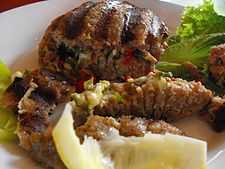
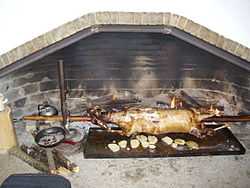
- Gyuvech
- Yahniya
- Plakiya
- Sarma
- Drob Sarma
- Wine or Tass kebab
- Kavarma
- Kapama
- Mish Mash
- Pilaf (Rice with chopped meat, vegetables or mussels.)
- Chomlek
- Mlin
- Stuffed courgettes
- Stuffed peppers
- Peppers börek
- Roasted beans
- Bean with sausage
- Pork with rice
- Roasted Chicken with Potatoes
- Pork with Cabbage
- Chicken with Cabbage
- Roasted Potatoes
- Wine, Tepsi or Tass Kebab
- Drusan kebab
- Rice with Chicken
- Tatarian Meatball
- Meatball with Sauce
- Kjufteta po Chirpanski (Meatballs with potatoes, recipe from Chirpan.)
- Meatloaf (called 'Rulo "Stefani"')
- Potato balls with Sauce
- Panagyurishte-Style Eggs
- Fried Courgettes with Yogurt Sauce
- Chicken in katmi (Popular in Thracian style)
- Fish Zelnik (No pastry dish with Sauerkraut and Rice.)
- Fish in pastry (Usually prepared from carp to St. Nicholas fast.)
- Stuffed Carp or Nikuldenski Carp (Prepared in all Bulgarian families to St. Nicholas fast.)
Breads and pastries
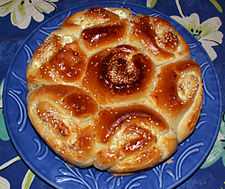

- Pita
- Sweet Pita
- Pita with Meat ( Or/and with Mushrooms or with Tomatoes and Onion.)
- Pogacha (Usual ritual bread.)
- Kravai (Usual ritual bread.)
- Kolak (Usual ritual bread.)
- Banitsa (The most popular pastry in Bulgaria with countless varieties.)
- Tikvenik
- Zelnik
- Baklava
- Saraliya
- Parlenki
- Patatnik
- Kachamak
- Byal Maj
- Tutmanik
- Milinka
- Gevrek
- Kozunak
- Mekitsa (- traditional Bulgarian dish made of kneaded dough made with yogurt that is deep fried.)
- Marudnitsi
- Katmi (Kind of Pancakes.)
- Palachinki (Kind of Pancakes.)
- Langidi
- Tiganitsi
- Dudnik
- Popara
- Sulovar
- Parjeni filii
- Kiflichki with jam or white cheese
- Solenki
- Yufka
- Trienitsa or Skrob
- Trahana
Cheeses and other dairy products

Bulgaria as a homeland of yogurt has a strong tradition in the making of a variety of dairy products.
- Sirene
- Kashkaval
- Kiselo mlyako (Traditional Bulgarian Yogurt which is produced using a culture of Lactobacillus delbrueckii subsp. bulgaricus and Streptococcus salivarius subsp. thermophilus bacteria.)
- Pryasno Sirene (Fresh cheese.)
- Sirene "Dunavia"
- Tsedeno mlyako (Dried yogurt.)
- Izvara
- Catak
- Zira
Sweets




Halva is a popular dessert in Bulgaria, and the term 'halva' (халва) is used for several varieties of the dessert. Tahini halva (тахан халва) is most popular and can be found in all food stores. Two different types of tahini halva are made - one using sunflower seed tahini and another using sesame seed tahini. Traditionally, the regions of Yablanitsa and Haskovo are famous for their halva.
- Pumpkin Dessert
- Baklava
- Buhti with yogurt
- Cookies "Peach" or Praskovki
- Fruit bread
- Garash cake ("Torta Garash")
- Katmi with jam or honey or/and cheese (Nowadays usually and with chocolate.)
- Kazanlak Donuts
- Kompot
- Kozunak
- Kurabiiki
- Lokum
- Maslenki
- Milk with Rice
- Oshav
- Tart with cherries or sour cherries (Typical for the region of Bobovdol.)
- Tart with different fruits
- Tatlii
- Tikvenik
- Tulumbichki
Spices and herbs
- Summer savory (Chubritsa)
- Spearmint (Djodjen)
- Sharena sol
Other staples
Traditional Bulgarian drinks
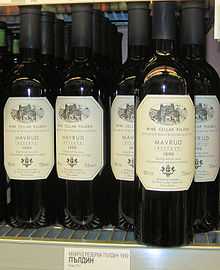

Wine
- Bulgarian wine
- Mavrud
- Pamid
- Gamza
- Melnik wine
- Dimyat
- Misket
- Muskat
- Nohan or Lipa
- Divachka
- Shivka
- Rubin
- Tamyanka
Distilled liquors
- Rakia
- Slivovitsa
- Gyulova Rakia (Rose Rakia)
- Muskat Rakia
- Mastika
- Menta
Beer
Fermented beverages
- Boza (Most popular recipes are from Radomir and Lyubimets)
- Ayran or Ayryan
- Matenitsa (Bulgarian Buttermilk)
- Etar
- Pitie (Drinks prepared from different squeezed fruit or herbs, whose juice is usually kept for several days to a month before consumption)
Hot beverages
- Tea (Tea usually prepared with one or several herbs and/or fruits)
- Greyana Rakiya (Mulled Rakiya - A winter alcoholic beverage)
- Greyano Vino (Kind of mulled wine - A winter alcoholic beverage)
See also
- European cuisine
- List of cuisines
- Cuisine of the Mediterranean
- Eastern European cuisine
- Macedonian cuisine
References
External links
- Bulgarian Cuisine
- Many recipes from Bulgarian Cuisine
- Cuisineeurope - Bulgaria
- Eating the Bulgarian way
- Bulgarian Traditional Dishes
- 100 Essential Bulgaria Recipes
| |||||||||||
| |||||||||||||||||||||||||||||||||||||||

